
International Journal of Ethics Education
Scope & Guideline
Exploring the Intersection of Morality and Learning
Introduction
Aims and Scopes
- Interdisciplinary Ethics Education:
The journal promotes the teaching of ethics across diverse fields including medicine, engineering, and social sciences, acknowledging that ethical dilemmas are prevalent in all professional practices. - Empirical Research on Ethics Education:
A significant focus is placed on empirical studies that assess the effectiveness of ethics education programs, exploring how these programs influence students' ethical attitudes and behaviors. - Innovative Pedagogical Approaches:
The journal supports the exploration of novel teaching methodologies such as project-based learning, online education, and the use of technology in ethics instruction, aiming to enhance engagement and moral reasoning. - Cultural and Global Perspectives:
The journal encourages discussions on ethics education from various cultural and global viewpoints, highlighting the necessity for context-sensitive approaches to teaching ethics. - Professional Development in Ethics:
It emphasizes the importance of training educators in effective ethics teaching practices, ensuring that instructors are well-equipped to address ethical issues in their classrooms.
Trending and Emerging
- Integration of Technology in Ethics Education:
There is a notable increase in research exploring the use of technology, such as AI and online platforms, in ethics education, reflecting the need to engage a tech-savvy student population. - Focus on Character Education:
Recent publications underscore the importance of character education and moral development, emphasizing traits such as empathy and integrity in ethical training for students. - Crisis-Responsive Ethics Education:
The impact of global crises, such as the COVID-19 pandemic, on ethics education is gaining attention, with studies examining how these events reshape ethical considerations in various professions. - Collaborative and Experiential Learning:
There is a growing trend towards collaborative learning and experiential methods in ethics education, such as moral case deliberation and peer discussions, which enhance critical ethical engagement. - Ethics in Emerging Fields:
Emerging topics such as bioethics, environmental ethics, and the ethical implications of new technologies are increasingly being prioritized, reflecting the need to address contemporary ethical challenges.
Declining or Waning
- Traditional Ethics Frameworks:
There appears to be a decrease in discussions centered around classical ethical theories and frameworks, suggesting a shift towards more contemporary and applied approaches to ethics. - Generalized Ethics Courses:
Fewer studies are being published on broad, generalized ethics courses, as there is a growing emphasis on specialized and context-specific ethics education tailored to particular disciplines or ethical dilemmas. - Static Teaching Methods:
Research focusing on traditional, lecture-based teaching methods for ethics education is declining, reflecting a trend towards more interactive and student-centered pedagogical strategies. - Focus on Compliance and Regulation:
The emphasis on compliance-related ethics education seems to be diminishing, with a growing focus on developing critical thinking and moral reasoning skills instead.
Similar Journals
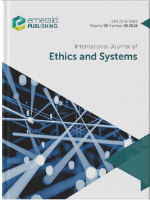
International Journal of Ethics and Systems
Bridging Philosophy and Economics through Ethics.International Journal of Ethics and Systems is a pioneering publication within the realm of ethics and systems, dedicated to the exploration of complex ethical frameworks and their applications across various domains, especially in economics and philosophy. Published by Emerald Group Publishing Ltd, this journal stands out with an impressive impact factor and robust rankings; it is classified within the Q1 quartile for Philosophy and Q3 for Economics and Econometrics in 2023, showcasing its interdisciplinary significance. With a wide readership scope and an exceptional Scopus ranking—32nd out of 806 in Philosophy—this journal serves as an essential resource for researchers, professionals, and students eager to engage with contemporary debates and innovative approaches in ethical theory and systemic analyses. Although it currently does not offer Open Access, the journal is readily accessible for those affiliated with institutions providing library subscriptions, reflecting its commitment to facilitate high-quality scholarly discourse. The journal's convergence period from 2018 to 2024 highlights its ongoing relevance and responsiveness to emerging trends in ethical inquiry.

SCIENCE AND ENGINEERING ETHICS
Bridging Ethics and Innovation for a Responsible FutureSCIENCE AND ENGINEERING ETHICS is a prestigious journal published by Springer, focusing on the intersection of ethics in scientific and engineering practices. With ISSN 1353-3452 and E-ISSN 1471-5546, this journal has been a critical platform for the dissemination of research from 1995 and continues to thrive as it approaches its convergence in 2024. The journal commands a significant reputation in its field, boasting Q1 rankings across multiple categories, including Health Policy, Health (Social Science), Issues, Ethics and Legal Aspects, and Management of Technology and Innovation in the 2023 category quartiles. Researchers and professionals will find it indispensable, as it ranks impressively in various Scopus metrics, particularly in Nursing and Health Policy, where it consistently places in the top percentiles. While the journal is not open access, its robust contribution to ongoing debates in ethics surrounding science and engineering makes it an essential read for scholars and practitioners seeking to navigate the complex moral landscapes of their fields.

Journal of Academic Ethics
Exploring the Foundations of Integrity in AcademiaThe Journal of Academic Ethics, published by Springer, is a premier scholarly outlet dedicated to the exploration and analysis of ethical considerations across various disciplines, including philosophy, education, sociology, and the broader arts and humanities. With an ISSN of 1570-1727 and E-ISSN of 1572-8544, this journal has established itself as a vital resource since its inception in 2005, continuing to provide insightful contributions through 2024. Recognized for its impactful research, it holds esteemed positions in multiple Scopus categories, including a Q1 ranking in both Arts and Humanities (Philosophy) and a Q2 ranking in Education and Sociology. This highlights the journal's significance in fostering ethical discourse among researchers and practitioners alike. Although it does not currently offer open access, the journal's robust academic framework ensures high-quality contributions that advance knowledge and promote critical discussions about ethical practices in academia and beyond. For anyone engaged in ethical inquiries, the Journal of Academic Ethics serves as an indispensable platform for innovative research and scholarly dialogue.

Journal of Practical Ethics
Bridging Theory and Real-World EthicsJournal of Practical Ethics is an esteemed open-access journal published by the Oxford Uehiro Centre for Practical Ethics, dedicated to enhancing the discourse surrounding ethical issues in various fields, including healthcare, technology, and social policy. Since its inception in 2013, the journal has fostered a robust academic platform for researchers, professionals, and students to explore and publish innovative ideas and solutions to real-world ethical dilemmas. The journal's commitment to making research freely accessible emphasizes its role in bridging the gap between academic inquiry and practical application, thereby encouraging a broader engagement with ethical considerations across disciplines. As the importance of ethical frameworks continues to grow in an increasingly complex world, the Journal of Practical Ethics stands as a vital resource for those seeking to influence policy and practice through rigorous ethical analysis.
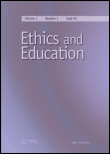
Ethics and Education
Transforming Educational Policies through Ethical InsightEthics and Education is a distinguished journal dedicated to exploring the complexities and intersections of ethical theory and educational practice. Published by Routledge Journals, Taylor & Francis Ltd, this journal has established itself as a pivotal resource for scholars and practitioners in the fields of education and philosophy. With a 2023 Q3 ranking in Education and an impressive Q1 ranking in Philosophy, as well as a notable Scopus rank in the 84th percentile for Philosophy, Ethics and Education provides a platform for rigorous research and impactful discussions that shape contemporary educational policies and practices. Although not open access, the journal is committed to fostering a rich dialogue surrounding ethical considerations in educational contexts, providing insights relevant for educators, policymakers, and researchers alike. With contributions spanning theoretical perspectives and practical implications, Ethics and Education is an essential read for anyone engaged in the pursuit of a just and equitable educational landscape.
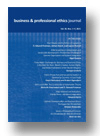
BUSINESS & PROFESSIONAL ETHICS JOURNAL
Championing Ethical Standards for a Better Business WorldBUSINESS & PROFESSIONAL ETHICS JOURNAL, published by the Philosophy Documentation Center, serves as a premier platform for rigorous research and discourse in the realms of ethics surrounding business practices and professional conduct. Since its inception in 1979, this journal has consistently contributed to the field, encompassing vital discussions that influence ethical standards in business and economics. With a rich historical arch spanning various converged years, it has evolved to become a key resource, currently enjoying a Q4 ranking in Business and International Management and Q4 in Economics and Econometrics in 2023, alongside a strong standing in the philosophy category. While being non-open access, the journal remains an essential reference point for academics and practitioners seeking to navigate the complex ethical landscapes of their fields. As the discourse around business ethics gains importance, the journal positions itself as a critical venue for sharing innovative insights and solutions, making it an invaluable resource for researchers, professionals, and students alike.
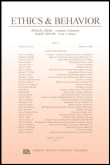
ETHICS & BEHAVIOR
Exploring the Nexus of Morality and ActionETHICS & BEHAVIOR is a leading academic journal published by Routledge Journals, Taylor & Francis Ltd that has been at the forefront of ethical and behavioral research since its inception in 1991. With an ISSN of 1050-8422 and an E-ISSN of 1532-7019, the journal is committed to exploring the complex interactions between morality, ethics, and human behavior in various social contexts. Recognized for its significant contribution to the field, ETHICS & BEHAVIOR holds a notable Q2 ranking in both general psychology and social psychology categories, with impressive Scopus rankings reflecting its academic impact and relevance. Although the journal is not open access, it remains an indispensable resource for researchers, professionals, and students seeking to understand the ethical dimensions of human behavior. Covering diverse topics from applied ethics to behavioral studies, ETHICS & BEHAVIOR serves as a platform for innovative ideas and rigorous empirical research, shaping the discourse in psychology and social sciences. Address: 2-4 Park Square, Milton Park, Abingdon OX14 4RN, Oxon, England.

Asian Journal of Business Ethics
Advancing Ethical Frameworks for Global BusinessAsian Journal of Business Ethics, published by SPRINGER, is a leading academic journal dedicated to fostering interdisciplinary research in the fields of business, ethics, and social responsibility. With an ISSN of 2210-6723 and E-ISSN of 2210-6731, this journal has Made its mark within the global academic community, boasting an impressive reputation reflected in its Scopus rankings across various categories. The journal is particularly noteworthy for its Q3 ranking in Business, Management and Accounting and a Q1 ranking in Philosophy as of 2023. With a commitment to open access, the journal serves as a valuable resource for researchers, professionals, and students in the pursuit of knowledge and best practices that align ethical principles with business processes. The Asian Journal of Business Ethics addresses pressing issues at the intersection of ethics and business while promoting impactful research that can drive practical solutions and inform policy decisions in an ever-evolving global marketplace. Since its inception in 2012, the journal has been instrumental in shaping discourse around ethical business practices, making it a vital outlet for innovative scholarship in the field.
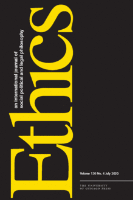
ETHICS
Engaging Minds in Philosophical EthicsETHICS is a premier academic journal published by The University of Chicago Press, specializing in the philosophical examination of ethical issues, moral principles, and their application across various contexts. With its ISSN 0014-1704 and E-ISSN 1539-297X, this journal stands out in the realm of ethics, earning a distinguished Q1 classification in Philosophy and ranking 58th out of 806 journals in the arts and humanities, according to Scopus in 2023, placing it in the 92nd percentile. ETHICS has been committed to interdisciplinary discourse since its inception in 1973, with its thought-provoking content published regularly until 1990, and resuming from 1992 to the present. This journal is vital for researchers, professionals, and students alike, offering profound insights into contemporary ethical dilemmas, thereby enriching the academic landscape with rigorous analysis and critical discussions. Although it is not Open Access, the journal continues to foster a vibrant community surrounding ethical inquiry, making it an invaluable resource for those engaged in philosophical and ethical research.

THEORETICAL MEDICINE AND BIOETHICS
Pioneering Research at the Crossroads of Ethics and Medicine.THEORETICAL MEDICINE AND BIOETHICS, published by SPRINGER, is an esteemed journal dedicated to exploring the complex intersections of medicine, ethics, and law. With its ISSN 1386-7415 and E-ISSN 1573-1200, this journal serves as a vital platform for scholars, practitioners, and students interested in the ethical implications of medical practices and innovations. Although it currently holds a Q4 impact factor in the categories of Issues, Ethics and Legal Aspects and Medicine (Miscellaneous) as of 2023, its relevance is amplified by its commitment to fostering critical discourse in a rapidly evolving field. The journal features a diverse range of articles that address profound ethical dilemmas in healthcare, making it a significant resource for contemporary research from 1997 to the present. As an open-access journal, it ensures that cutting-edge knowledge is readily available, inviting contributions that challenge conventional thought and advance the field of bioethics.